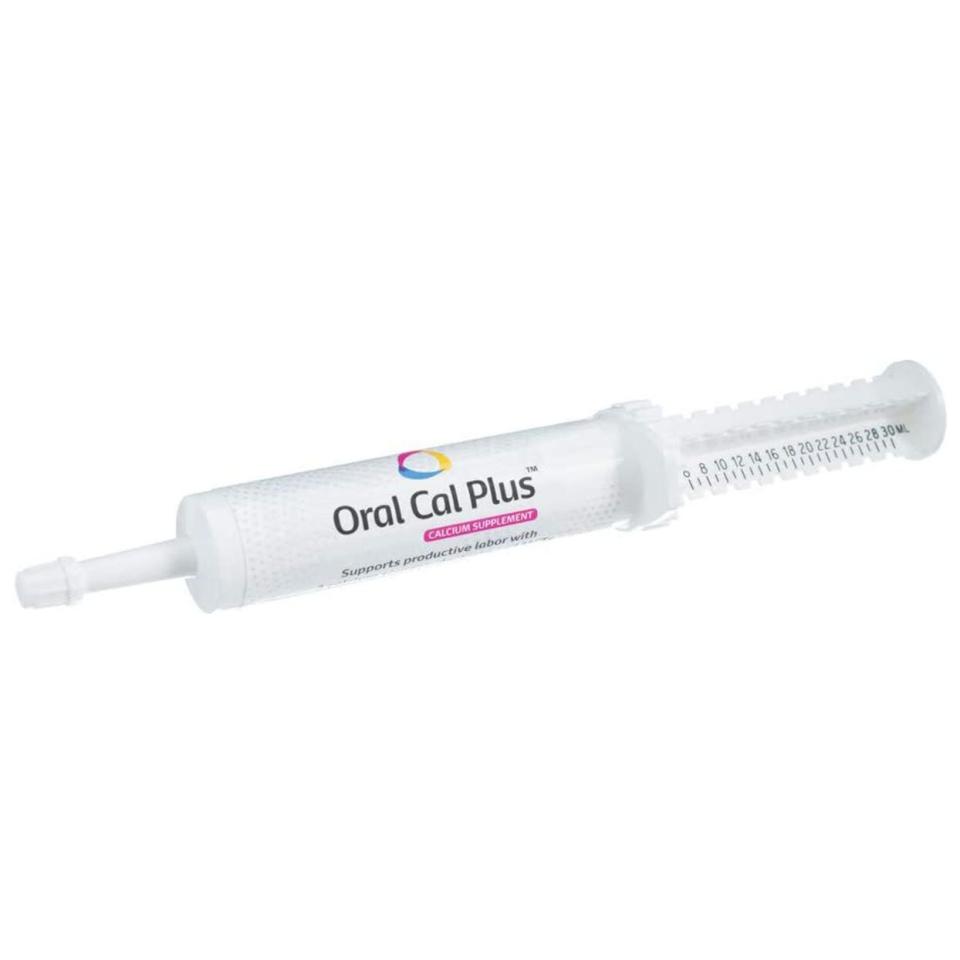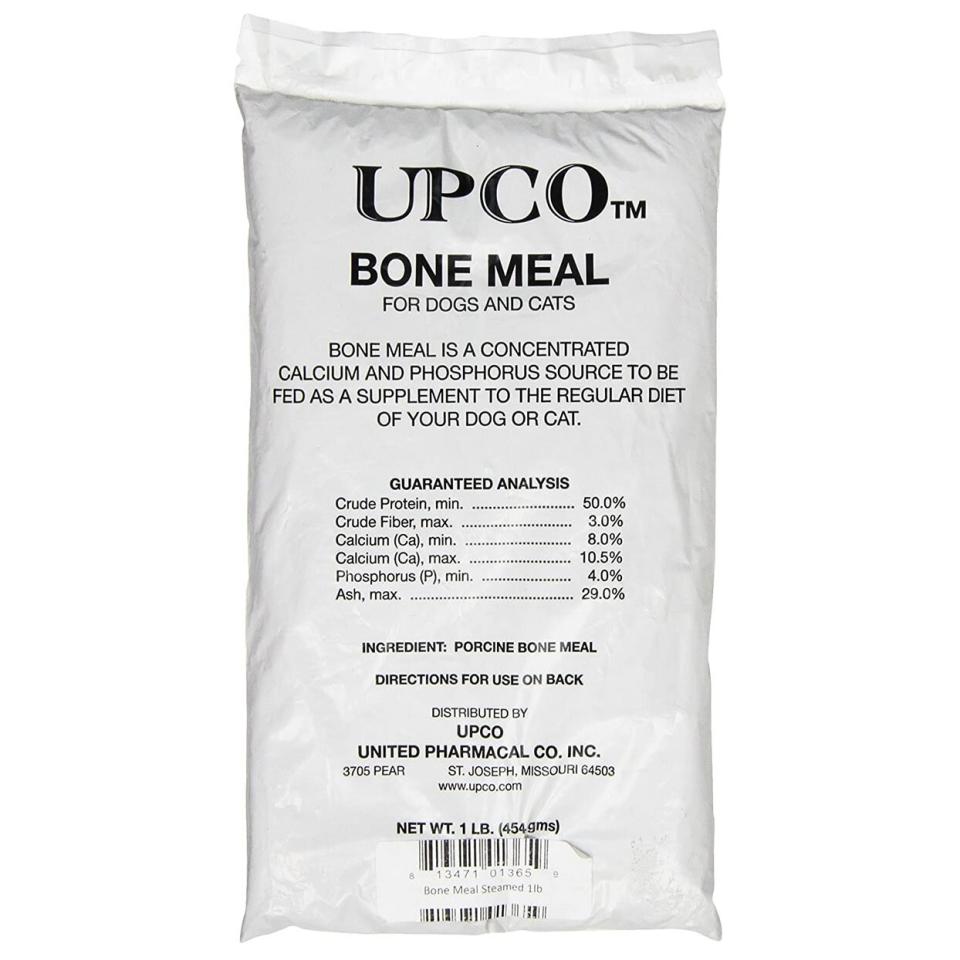Do Dogs Need Calcium Supplements?

Brothers91 / Getty
Calcium is a mineral that helps with your dog's growth, maintaining healthy bones and teeth, proper muscle building and function, heart health, and maintaining a healthy nervous system. Dogs (and humans!) cannot produce this mineral naturally, so they must obtain it from food.
A healthy dog fed commercial dog food will get the recommended amount of calcium in their diet. However, there are some health issues that can cause your pooch to need more calcium. Even so, it's always a good idea to consult with your veterinarian before introducing a new supplement into your pup's diet.
How Much Calcium Does a Dog Need?
According to Linda Simon, MVB, MRCVS, a veterinary surgeon and veterinary consultant for FiveBarks, the average, healthy dog should be consuming about 1.25 grams of calcium for every 1,000 calories they take in. As such, the specific amount taken in will vary depending on your dog's daily calorie requirement. "Those who are growing, lactating, and pregnant typically have higher calcium requirements, which is reflected in their food. This is why it is always so important to feed a diet targeted at the correct life stage of your dog," Simon says.
Pregnant and nursing dogs do require more calcium in order to help promote bone growth in the pups. If a dog takes in too little calcium when she is pregnant, it can lead to eclampsia which is a life threatening condition when the nursing dog's blood calcium levels drop. Eclampsia (also dubbed milk fever) most commonly occurs when the pups are between one to four weeks old, the time when the mom is producing the greatest amount of milk.
Signs of Low Calcium in Dogs
When a dog has low levels of calcium in their blood, which doesn't allow them to function properly, it is known as hypocalcemia. Smaller breeds and dogs nursing many offspring may be at a higher risk for hypocalcemia compared to larger breeds with smaller litters.
According to Jacqueline Brister, DVM, veterinarian and consultant for Embrace Pet Insurance, signs of hypocalcemia include:
Stiffness
Restlessness
Agitation or unusual behavior
Excessive drinking and urinating
Disorientation
"Some of these symptoms are seen with other diseases as well, so low calcium cannot be determined based on symptoms alone," Brister says. "Blood tests must be done to assess the amount of calcium circulating in the blood."
Do I Need to Add More Calcium to My Dog's Diet?
Always consult your veterinarian before giving your dog a calcium supplement as too much calcium can have dangerous health consequences.
According to veterinarian Corinne Wigfall, BVMBVS, BVMedSci, spokesperson for SpiritDog Training, some of the conditions that can lead to hypocalcemia, or low blood calcium, include:
Hypoparathyroidism (underactive parathyroid gland)
Kidney disease and kidney failure
Malabsorption (failure of the intestines to absorb calcium)
Hypoproteinemia (low levels of protein)
Toxin ingestion
Pancreatitis
A blood test is needed to determine these conditions and potentially an ultrasound and/or X-ray to work out the exact cause of the hypocalcemia.
What Happens If a Dog Has High Calcium?
According to Wigfall, "Too much calcium can be given in the form of oral supplementation as this product is easily purchased at pet stores or online." To determine if your dog has high calcium, your veterinarian will "do a blood test and may admit your dog into the clinic for IV fluid therapy which helps reduce the blood calcium levels over time and stopping the calcium supplementation," Wigfall explains. It is important to determine the source of the high calcium as severe cases of hypercalcemia can lead to nonreversible kidney damage.
Signs of calcium supplement overdose include:
Vomiting
Diarrhea
Blood in the urine or stool
Upset stomach
Stomach pain
Increased thirst
Shaking
Frequent urination
Collapsing
Rapid breathing
Extreme exhaustion
Muscle weakness
6 Best Vet-Recommended Calcium Supplements for Dogs
Calcium supplements for dogs are sold in various forms including powders, tablets, and chewables. They can come from a variety of sources, but seaweed and eggshell tend to be the most common. Always speak to your veterinarian before starting your dog on a calcium supplement as too much calcium in the diet can be dangerous. Below you'll find several recommended calcium supplements for dogs.
1. Animal Essentials Seaweed Calcium Supplement
This calcium supplement comes from calcified red seaweed that contains a variety of essential nutrients, including calcium, magnesium, boron, and zinc. The seaweed is harvested from the seabed off the coast of Iceland, where each batch is cleaned, heat-processed, and tested for purity by an analytical lab. The supplement comes in powder form and is virtually odorless.

2. NaturVet Calcium-Phosphorus For Dogs Plus Vitamin D
This supplement is recommended by Karen Riley, CVN, Founder & Certified Pet Nutritionist at ihavedogs.com, as it contains vitamin D for better absorption and is best for puppies and fast-growing breeds. The powder supplement provides essential minerals for building and maintaining healthy bones. The powder can be sprinkled over your dog's meal. Intended to be used in dogs over the age of 12 weeks.

3. Revival Animal Health Breeder's Edge Oral Cal Plus Fast Absorbing Oral Calcium Supplement
This calcium supplement provides three calcium sources and other nutrients that they may need during labor or nursing. The calcium is easy to administer in a plunger syringe design.

4. Dog Greens Seaweed Calcium for Pets
This calcium supplement is made from all-natural algae and another recommendation from Riley. It is made from 100-percent wild harvested Icelandic calcareous marine algae and is kosher certified, halal certified, allergen free, GMO free, and vegan. It is also tasteless and easy to mix into food.

5. Nutrition Strength Calcium Phosphorus Supplement
This calcium supplement has been formulated to promote bone development in puppies, during periods of rapid growth, and for grown dogs to supply them with the right blend of ingredients needed to provide the optimal calcium balance. The tablets can be taken with your dog's food or separately. It is ideal for dogs of all ages, shapes and sizes. Made in the USA.

6. UPCO Bone Meal
This all-natural supplement made from porcine bone meal provides calcium and phosphorus. The powder can be easily sprinkled over your pup's meal.


